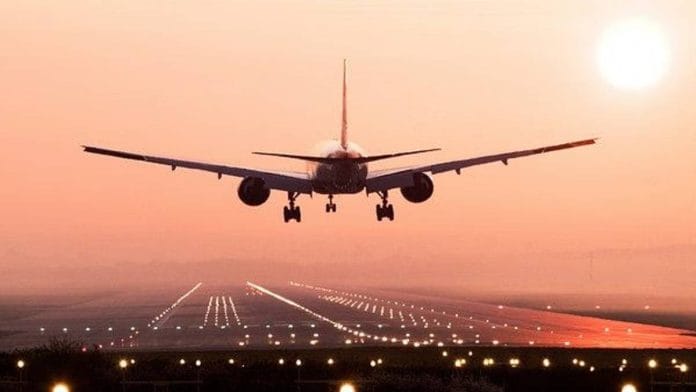New Delhi: A parliamentary panel has flagged a nearly 50 percent shortfall in manpower required in the Directorate General of Civil Aviation (DGCA) and also urged the civil aviation ministry to examine the feasibility of a “comprehensive whistleblower protection framework”. The panel’s report reviewing India’s civil aviation sector was tabled in both the Rajya Sabha and Lok Sabha Wednesday.
Coming in the backdrop of the Air India plane crash in Ahmedabad this June, the report also recommends establishing just culture policies, monitoring of pilot training infrastructure, crew fatigue management and empowering aviation regulator DGCA.
“The ministry must examine the feasibility of instituting a robust, legally-backed whistleblower protection framework applicable to all aviation personnel. This framework is essential to build trust and must include a secure, fully anonymous and independent reporting channel, managed outside the direct control of the employee’s organisation. A well-defined and transparent process for investigation of all reported concerns and for providing feedback to the whistleblower on the actions taken (is needed),” states the report.
It further urges strong statutory safeguards that explicitly prohibit any form of retaliation, professional harm or victimisation of employees who report safety concerns in good faith, and recommends that just policies and protections must be actively promoted and publicised industry wide.
The 380th report on the ‘Overall Review of Safety in the Civil Aviation Sector’ was presented by MP Sanjay Kumar Jha, who leads the parliamentary panel.
Also Read: Air India crash: Data from recovered AI-171 Black Box downloaded, analysis underway
‘Systemic inertia in undertaking reform’
The panel noted that the DGCA needs to be empowered in a time-bound way with greater autonomy, which has also been highlighted in the past.
“The fact that these well-reasoned recommendations, repeatedly acknowledged by the ministry, remain largely unimplemented points to a long-standing and systemic inertia in undertaking fundamental regulatory reform,” the report states.
According to the committee, the root problem lies in the recruitment model of the DGCA, which doesn’t match the modern and specialised regulator. This leaves the aviation watchdog in an “unsustainable position” since it also lacks the independent authority to conduct its own recruitment and affects the “regulator’s ability to attract talent and enforce compliance”.
The committee thus recommends that the DGCA be given full administrative and financial autonomy and DGCA recruitment should be separated from the Union Public Service Commission framework.
The report mentions that the data provided revealed a stark reality—out of a total sanctioned strength of 1,063 posts in the DGCA, only 553 are currently filled, representing a staggering shortfall of nearly 50% in manpower. This highlights a major vulnerability at the very heart of India’s aviation safety oversight system.
In July, Civil Aviation Minister Rammohan Naidu had informed the Rajya Sabha that 190 of 410 DGCA vacancies would be filled this year.
“A new, specialised recruitment body or mechanism must be established, with the flexibility to respond swiftly to the dynamic needs of the aviation sector. This mechanism should also explore dedicated training programmes and academies for regulatory professionals within India, potentially offering scholarships or assured placements to attract promising engineering, legal, and operational graduates directly into the DGCA’s workforce, thereby building a sustainable domestic talent pool for the safety oversight function,” states the report.
Unresolved safety deficiencies
The other key recommendations in the report include continuous fatigue evaluation and management for flight crew, strict compliance with flight duty time limitation regulations for pilots, promotion of mental health awareness and support for both crew and Air Traffic Control (ATC) officers, as outlined in DGCA circulars.
Additionally, comprehensive staff auditing must be in place to mitigate ATC fatigue as well as staffing deficits and ATC automation systems must be overhauled with incorporation of modern AI-driven tools.
A key recommendation is the need to establish a time-bound mechanism to close all safety deficiencies.
“This is a response to the significant and growing backlog of unresolved safety findings, which indicates a critical weakness in the post-surveillance rectification process that undermines the entire oversight programme. Concerns also exist about audit quality due to a lack of qualified DGCA staff and airlines prioritising profiteering over immediate maintenance,” the report states.
The committee further suggests terrain-specific pilot training and a uniform national regulatory framework, emphasising that this has been prompted by a series of chopper accidents, including in pilgrimage operations in critical environmental conditions managed by state agencies.
Moreover, the report mandates a detailed root-cause analysis for every runway incursion and other recurring high-risk events and recommends focused remedial programmes for these areas.
“Specific data on bird strikes and engine failures underscores the need for effective remedial measures despite existing systematic oversight,” it says.
(Edited by Nida Fatima Siddiqui)






